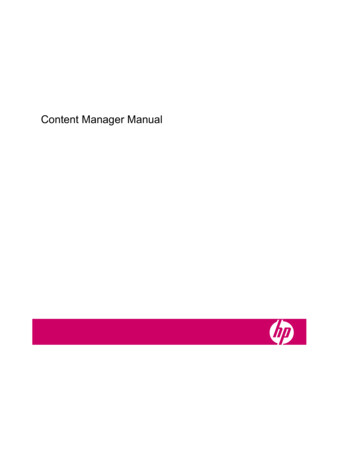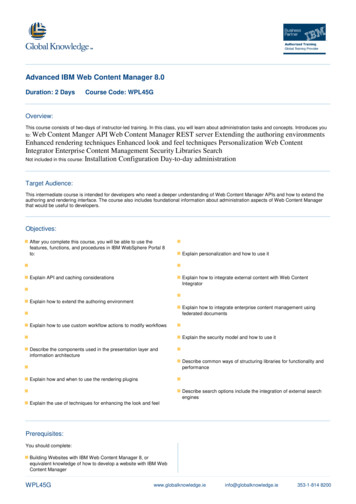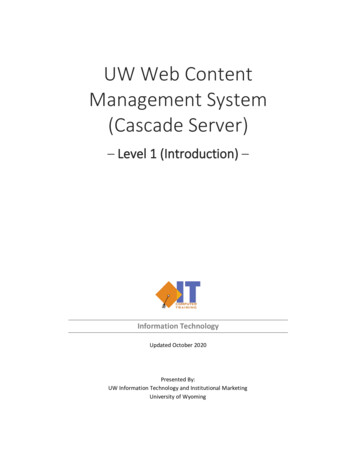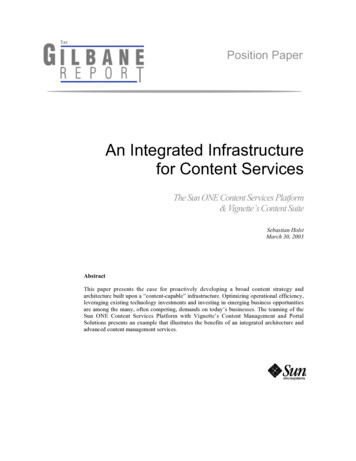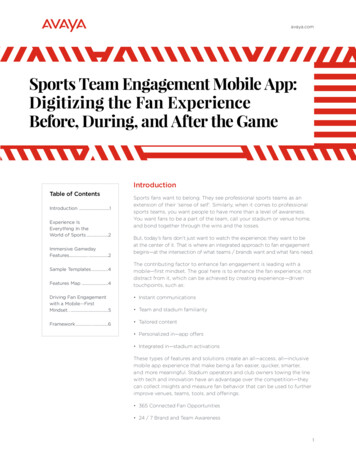
Transcription
Pezoa et al. Veterinary Research 2014, /2RESEARCHVETERINARY RESEARCHOpen AccessOnly one of the two type VI secretion systemsencoded in the Salmonella enterica serotypeDublin genome is involved in colonization of theavian and murine hostsDavid Pezoa1†, Carlos J Blondel1†, Cecilia A Silva1, Hee-Jeong Yang2, Helene Andrews-Polymenis2,Carlos A Santiviago1 and Inés Contreras1*AbstractThe type VI secretion system (T6SS) is a virulence factor for many Gram-negative bacteria. Salmonella genus harborsfive phylogenetically distinct T6SS loci encoded in Salmonella Pathogenicity Islands (SPIs) SPI-6, SPI-19, SPI-20, SPI-21and SPI-22, which are differentially distributed among serotypes. The T6SSs encoded in SPI-6 and SPI-19 contributeto pathogenesis of serotypes Typhimurium and Gallinarum in mice and chickens, respectively. Salmonella Dublin isa pathogen restricted to cattle where it causes a systemic disease. Also, it can colonize other hosts such as chickensand mice, which can act as reservoirs of this serotype. Salmonella Dublin harbors the genes for both T6SSSPI-6 andT6SSSPI-19. This study has determined the contribution of T6SSSPI-6 and T6SSSPI-19 to host-colonization by SalmonellaDublin using avian and murine models of infection. Competitive index experiments showed that, a mutant strainlacking both T6SSs (ΔT6SSSPI-6/ΔT6SSSPI-19) presents a strong colonization defect in cecum of chickens, similar to thedefect observed for the ΔT6SSSPI-6 mutant, suggesting that this serotype requires a functional T6SSSPI-6 for efficientcolonization of the avian gastrointestinal tract. Colonization of mice was also defective, although to a lesser extentthan in chickens. In contrast, the T6SSSPI-19 was not necessary for colonization of either chickens or mice. Transfer ofT6SSSPI-6, but not T6SSSPI-19, restored the ability of the double mutant to colonize both animal hosts. Our dataindicate that Salmonella Dublin requires only the T6SSSPI-6 for efficient colonization of mice and chickens, and thatthe T6SSSPI-6 and T6SSSPI-19 are not functionally redundant.IntroductionThe genus Salmonella contains over 2500 serotypes distributed in two species, S. enterica and S. bongori [1]. Depending on the serotype and the immune status of the infectedhost, Salmonella can produce a wide spectrum of clinicalsigns ranging from self-limiting diarrhea to systemic illness.Some serotypes are able to infect a wide range of hosts,while others can infect only one animal species [2]. Salmonella enterica serotype Dublin (Salmonella Dublin) infectionis restricted to cattle, where it causes a serious systemic disease characterized by pneumonia, arthritis, osteomielytis,* Correspondence: icontrer@uchile.cl†Equal contributors1Departamento de Bioquímica y Biología Molecular, Facultad de CienciasQuímicas y Farmacéuticas, Universidad de Chile, Santos Dumont 964,Santiago, ChileFull list of author information is available at the end of the articlemeningoencephalitis, enteritis and, in some cases, abortion,leading to economic losses in animal industry [3-7].Salmonella Dublin can also infect humans via consumptionof raw milk from infected cattle, constituting an importantthreat to public health [8-10]. In addition, some studieshave reported the isolation of Salmonella Dublin fromchickens and wild mice, suggesting that these animal hostscan act as environmental reservoirs of Salmonella Dublin.In one report, Salmonella Dublin was isolated from feces ofwild mice in a farm with high prevalence of this pathogenin cattle, suggesting that rodents may act as reservoirs andeventually contribute to Salmonella Dublin transmission tosusceptible cows [11]. Chickens may also act as reservoirsfor this serotype, as Salmonella Dublin is able to colonizechickens without clinical symptoms, contributing to transmission of salmonellosis to cattle and humans [12]. 2014 Pezoa et al.; licensee BioMed Central Ltd. This is an open access article distributed under the terms of the
Spin Miniprep Kit" (QIAGEN, MD, USA). Genomic DNA was isolated using the "GenElute Bacterial Gen-omic DNA" kit (Sigma-Aldrich, MO, USA). PCR prod-ucts were purified using the "QIAquick PCR Purification Kit" (QIAGEN, MD, USA). Ligations were performed . DH5α/R995-VC6 Strain harboring plasmid R995-VC6 This study Salmonella Dublin


